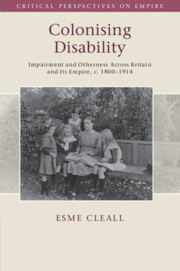Book contents
- Colonising Disability
- Critical Perspectives on Empire
- Colonising Disability
- Copyright page
- Dedication
- Contents
- Tables
- Acknowledgements
- Introduction
- 1 Disability and Otherness in the British Empire
- 2 Saving the Other at Home and Overseas
- 3 ‘A Fearfully and Wonderfully Made Individual’
- 4 Signs of Humanity
- 5 A Deaf Imaginary
- 6 Immigration
- 7 The Health of the Nation
- 8 Conclusion
- Bibliography
- Index
5 - A Deaf Imaginary
Disability, Nationhood and Belonging in the ‘British World’
Published online by Cambridge University Press: 21 July 2022
- Colonising Disability
- Critical Perspectives on Empire
- Colonising Disability
- Copyright page
- Dedication
- Contents
- Tables
- Acknowledgements
- Introduction
- 1 Disability and Otherness in the British Empire
- 2 Saving the Other at Home and Overseas
- 3 ‘A Fearfully and Wonderfully Made Individual’
- 4 Signs of Humanity
- 5 A Deaf Imaginary
- 6 Immigration
- 7 The Health of the Nation
- 8 Conclusion
- Bibliography
- Index
Summary
This chapter explores how one particular group of people defined as disabled, Deaf people, experienced and articulated that identity. Whilst deaf people were labelled ‘foreigners in their native land’, in this chapter I argue that deaf people came to inhabit distinct cultural identities, positively identifying with what they called the ‘deaf World’, or sometimes the ‘deaf nation’. Working from the twenty-first century backwards, there is good reason to focus on deafness as a particular case study here: contemporary theorists have argued that deaf identity is so strong that it operates as a form of ‘ethnicity’. Whilst, as I discuss, there continues to be disagreement about the utility of framing deaf people as an ethnic group, I use the idea of deafness as an ethnicity as a starting point to think about deaf community in the nineteenth and early twentieth centuries. In particular, I explore what deaf belonging means for the intersection of identities based around nationhood with those constructed around disability. The Chapter therefore explores, deaf communities in Britain (through the deaf press, deaf intermarriage etc), deaf plans for a separatist deaf state or colony, and deaf internationalism.
Keywords
- Type
- Chapter
- Information
- Colonising DisabilityImpairment and Otherness Across Britain and Its Empire, c. 1800–1914, pp. 148 - 181Publisher: Cambridge University PressPrint publication year: 2022

